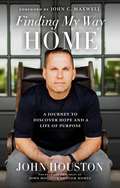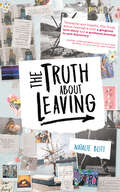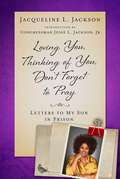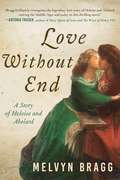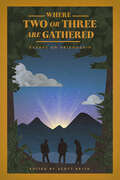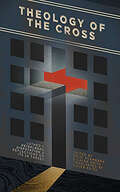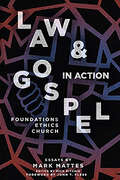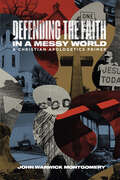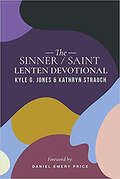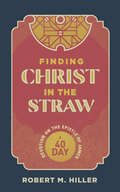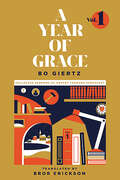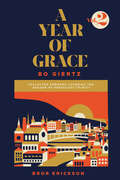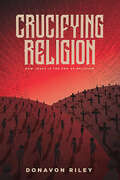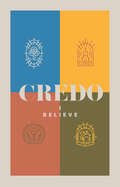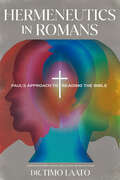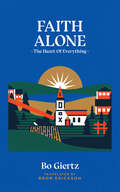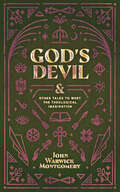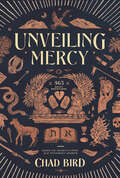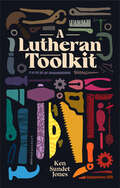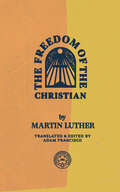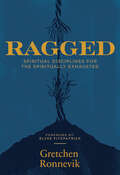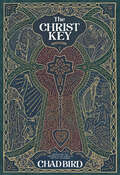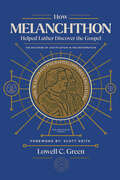- Table View
- List View
Finding My Way Home: A Journey to Discover Hope and a Life of Purpose
by John HoustonAfter many years of searching, John Houston found his way home—his true home. Now, he wants to help you do the same.John Houston has spent the past sixteen years building for others what he didn&’t always have for himself growing up: a family home. Today, John is one of the premier custom home builders in Texas. Throughout the Dallas-Fort Worth area, you see signs proudly presenting &“John Houston Custom Homes&” that paint a picture of the kind of home life John would have done anything to have as a child. From a young age, home was not a place where John wanted to be. After his parents divorced and his mother moved out, his father remarried and moved in with his new family. John and his older brother struggled to adjust and began living by themselves with little to no adult supervision at the ages of 11 and 15. They helped support themselves financially by working long hours running a lawncare business before and after school. The years that followed were challenging but also marked by God&’s protection, even when John didn&’t realize it, as he overcame hardships that could have permanently derailed his life. He met and married the woman of his dreams, completed his education and became a respected and successful business owner. And he isn&’t confused for one second about who&’s ultimately responsible for his success: God. In Finding My Way Home, John Houston reflects on a life of trials, hardships, and painful mistakes through the lens of gratitude for God&’s enduring faithfulness. He explains, &“God created a story with my life that puts a spotlight on His mercy and grace—a story of my anger and His forgiveness; of the broken family I grew up in and His restoration; of my demanding &‘leadership&’ as a husband and father and His model for me to lead with love.&”
The Truth About Leaving
by Natalie BlittLucy Green thought she had her senior year in the bag. Cute boyfriend? Check. College plan? Check. But when her boyfriend dumps her the week before school starts and she literally stumbles into Dov, the new Israeli transfer student, on her first day of school, Lucy’s carefully mapped-out future crumbles. Determined to have a good senior year, and too busy trying to hold her family together while her mom is across the country working, Lucy ignores the attraction she feels to Dov. But soon, Lucy and Dov’s connection is undeniable. Lucy begins to realize that sometimes, you have to open yourself up to chance. Even if the wrong person at the wrong time is a boy whose bravery you admire and who helps you find your way back to yourself.
Loving You, Thinking of You, Don't Forget to Pray: Letters to My Son in Prison
by Jacqueline L. Jackson Jesse L. Jackson Jr.From a mother, role model, and civil rights veteran, an inspiring gift of love to a child in his darkest hour.Jacqueline Jackson promised her son, Congressman Jesse L. Jackson, Jr., that she would write him every day during his incarceration in federal prison to serve his thirty-month sentence. This book is an inspiring and moving selection of the letters she wrote him. Together, they comprise a powerful act of love—nurturing and ministering to her son's heart, health, and mind and maintaining his essential connection with home. Frank, anecdotal, imbued with faith, and sometimes humorous, they offer intimate details from the family’s daily life, along with news of friends and the community and glimpses of such figures as Nelson Mandela, Winnie Mandela, and Mayor Marion Barry. They also touch eloquently on issues of social justice, politics, and history, as when Mrs. Jackson recalls growing up in Jim Crow Florida, and they reflect the qualities, instilled by her own mother, that made her a role model for much of her life. Ultimately, these letters offer a blueprint for why we have to support our families not just as they elevate but when they fall. This collection is Mrs. Jackson's contribution to healing during a time when our prisons are full and our communities are suffering. She provides the road map for ensuring that the individuals serving sentences understand that prison is where they are, not who they are and for helping them sustain the courage to keep hope alive.
Love Without End: A Story of Heloise and Abelard
by Melvyn BraggThe Timeless Romance of Heloise and Abelard Is Given New Life in this Poignant Novel by an Award-Winning Author, for Fans of Philippa Gregory and Elizabeth Chadwick The tale Heloise and Abelard has captivated the attentions of romantics since the twelfth century. Heloise was a woman beyond her time: educated, fierce, and unafraid to be herself. When Peter Abelard, a radical philosopher determined to reform the archaic practices of the Church from within, becomes her private tutor, the attraction is overwhelming. Their passionate love affair soon becomes dangerous, as enemies and opportunists hide in every shadow. In the twenty-first century, Arthur, a historian and author, roams the city of Paris to step into the shoes of Peter Abelard, to understand his true reasoning for abandoning Heloise. Needing to discuss his hypothesis and hoping to reconcile, Arthur invites his estranged daughter, Julia, to join him in the city of lights. But Julia could care less about lovers long dead; she is on a mission to discover the truth about her parents, and why her father left. Told in alternating narratives that transcend centuries, Love Without End delivers an unflinching look into relationships, fractured and whole, to discover the true nature of love in all its forms.
Where Two Or Three Are Gathered: Essays on Friendship
by Scott Leonard KeithFriendship is an amazing and wonderful thing. For the church, friendship is vital. When we gather around the gifts of Christ, we gather together. We need others who will bear the external Word for us, and in so doing we make our stand in an eternal friendship against the Devil, the world, and our own sinful hearts. The handing over of the goods—that is, the proclamation of salvation by grace through faith in Christ alone—will continually call for the creation and endurance of friendship. It is In friendship that we will be able to hold the line until our Lord, the Friend of Sinners, returns.
Daughter: Our Story Remembered
by Cindy KochFor any woman, identity is important. The question, "who am I?" will haunt her every decision. Along the pathway of life, many will tell her a story of who she is. She might be lucky enough to hear the pure and simple truth, but more often than not she will be told and believe a variety things. Consequently, both men and women have become confused, afraid, angry, and bitter towards the story of woman in our culture because, tragically, we have forgotten the ancient story spoken by God's Word. Discover again the old story of a beautiful identity, a story of love and sacrifice. Uncover this story of new hopes and amazing dreams that are actually real. The story offers incredible comfort, gives guidance, and teaches everyone who listens a wisdom that saves lives. From the creative voice of God, through the death of a Savior, to the walk of Wisdom, hear and remember the forgotten story of woman.
Theology of the Cross: Luther's Heidelberg Disputation & Reflections on Its 28 Theses
by Chad Bird Caleb Keith Kelsi Klembara Cindy Koch Steven D Paulson Daniel Van VoorhisThe Theology of the Cross is one of the core elements of Martin Luther's theology. The development of this doctrine through the Heidelberg Disputation has been considered an essential element of Luther's breakthrough on justification, and crucial to his theological reforms and future split with the Roman Catholic Church. These statements by Luther, originally penned to be defended in debate, are counter-intuitive, contrary, offensive, and thrilling paradoxes, starting with the first and most astounding of them all: "The Law of God, the most salutary doctrine of life cannot advance humans on their way to righteousness, but rather hinders them." We hope the collection of interpretations that follow the theses in this book will help you to understand their impact.
Law & Gospel in Action: Foundations, Ethics, Church
by Mark C MattesMark Mattes' hope is not only to secure believers' consciences in Christ but also to reclaim theological and social turf which mainline Protestants have too quickly ceded to various secular agendas. The collected essays engage the reality of believers' death and resurrection in Christ, and how that bears upon the life of faith while also attending to a wide range of relevant theological topics such as scriptural authority, apologetics, a critique of contemporary mainline Protestant and Evangelical Catholic ethics, a critique of Lutheran-Reformed ecumenism, and the church's mission and outreach. The collection concludes with several sermons based on Old Testament lessons seeking to show how the theology embedded in the essays can be used for proclamation.
Defending the Faith in a Messy World: A Christian Apologetics Primer
by John Warwick MontgomeryMuch to the dismay of its critics, defending the Christian faith does not rest on a complicated, philosophical quest nor illogical assumptions. The task of defending the Christian faith – or Christian apologetics – is for every Believer. In this easy-to-read, beginners guide to Christian apologetics, scholar and apologist Dr. John Warwick Montgomery lays the groundwork for why the case for Christianity is factually and historically compelling as well as how we should defend the faith.The book's three sections will lead you through the importance of Christian apologetics, issues the nonbeliever may raise, and how to bring the centrality of the faith – Christ on the cross – before atheists, skeptics and people from other worldviews.For those who want a lighthearted yet thorough introduction to the how, why and what of Christian apologetics, this primer is a go-to guide for those who hope to "be ready always to give an answer for the faith that is within" (1 Peter 3:15).
The Sinner/Saint Lenten Devotional (The Sinner/Saint Devotional Series)
by Kyle G Jones Kathryn MoralesDuring the forty days of Lent, we explore the gift of repentance that turns us back to Christ and his finished work. There is no repentance apart from Christ. There is no Lent apart from Christ's suffering on our behalf. There is no hope apart from his righteousness gifted to us. All of these daily devotions are written with these great truths in mind. Dear Sinner/Saint, prepare to be told in these pages to go home to your forgiving Father over and over.* Foreword by Daniel Emery PriceEach day featuresa bible passagereflectionshort prayersuggestions for further reading
Finding Christ in the Straw: A Forty-Day Devotion on the Epistle of James
by Robert HillerJames wrote to Christians whose faith was under attack. Persecution, false teachings, and loveless actions were troubling God's baptized people.Things have not changed much for the church in these latter days. Though Luther referred to this letter as "an epistle of straw," James gives much wisdom to Christ's troubled bride.In his foreword to Finding Christ in the Straw: A Forty-Day Devotion on the Epistle of James, Robert M. Hiller writes "[Martin] Luther felt that this letter lacked the focus on the person and work of Jesus Christ to warrant much of his energy. Straw has its benefits but is not all that useful in the long run."However, these forty devotions, based on James, will both challenge and comfort you, while showing you Christ in the straw.
A Year of Grace, Volume 1: Collected Sermons of Advent through Pentecost (A Year of Grace)
by Bror Erickson Bo GiertzThese sermons are taken from various stages in Bo Giertz pastoral career, from his time as a parish pastor, his time as a bishop, and his time in retirement. He adapted the homiletical style of Henric Schartau (whose homiletical style informs the novel "The Hammer of God"). Schartau would preach in a manner that expounded on the text before applying it to people who might find themselves in three different spiritual conditions, sometimes this is referred to as an Ordo Salutis. These three would be that of an unbeliever, a newly awakened Christian or young believer, and that of a mature believer. This has met with some controversy over the years as it was often identified with pietism, however Bo Giertz is aware of the pitfalls of this approach and turns the method in a matter that emphasizes the strengths. When it comes to the order of grace, Bo Giertz would say that it is not the order that matters but the grace.
A Year of Grace, Volume 2: Collected Sermons of Advent through Pentecost (A Year of Grace)
by Bror Erickson Bo GiertzA Year of Grace Vol. 2 is a collection of Bo Giertz's sermons from the second half of the liturgical calendar following the day of Pentecost. He preached the earlier sermons in his ten years as a parish pastor at Torpa, a small rural town in Sweden where he began his pastoral career and wrote such books as The Hammer of God and With My Own Eyes. These early sermons are strongly influenced by the ordo salutis (order of salvation) that he took over from Henric Schartau, yet always with an emphasis on salvation by grace rather than the order. His later sermons were preached as the Bishop of Gothenburg throughout his diocese and as a guest preacher elsewhere. These retain the influence of Henric Schartau in that they seek to directly address the "three hearers"--unbelievers, those awakened to the law, and mature Christians--yet his style takes on more subtlety in when, where and how these hearers are addressed in the context of the sermon. The result is a collection of sermons that provide both great weekly devotions (as the collection was intended) and a program of study for pastors and others wanting to learn how to "rightly handle the word of truth." (2 Tim. 2:15)
Crucifying Religion: How Jesus is The End of Religion
by Donavon RileyJesus is the end of all religion. All the sacrifices of priests and people are rendered null and void by Jesus' one-time-for-all-time sacrifice for all people, everywhere, past, present, and future tense. Jesus' death and resurrection save us from our own religiosity.
Credo: I Believe
by Caleb Keith Kelsi KlembaraThe chapters of this book are concerned with the most basic creed—the Apostles' Creed. Each addresses a particular article within it and what it means to confess it. Far from being pious artifacts, they are gifts to Christians as they seek to always stand firm in the faith and remain united with Christ in his death and resurrection.
Vocation: The Setting for Human Flourishing
by Raleigh SadlerHow shall we live? What is the good life? What is the value of a person? What is my place in this world? Is God active in this world? These are questions that have been asked in every culture and in every era. From the Hebrew concept of Shalom (wholeness/well-being) to the Greek concept of Eudaimonia (happiness) and even to the American notion that all people have the right to life, liberty, and the pursuit of happiness, great thinkers have pondered what it means for humans to flourish. The doctrine of vocation uniquely answers these questions. A certain level of security, prosperity, and freedom are essential components of human flourishing. God provides these components by working through humans in their stations in life such as parents and police (security), farmers and bankers (prosperity), and soldiers and governments (freedom). And yet there is more for which we humans strive. We are the types of beings whose wonderment drives us to the pursuit of knowledge, justice, and achievement. In short, we desire to be justified. We want to be valued. We want to be right or just. We strive for epic-ness. But no mere human adulation will satisfy. Nor can we justify ourselves before God with our broken lives. God justifies Christians through Christ and then uses them. God adds another component to human flourishing: purpose. He uses Christians in his economy of love to take care of the world. He lifts us from the ordinary to accomplish the extraordinary even as we carry ordinary tasks. For the Christian these stations become callings or vocations. This can only fully be appreciated if the Christian knows that he or she is free from pleasing God through works. Once the Christian is freed from this burden the whole of the Christian life is reoriented to the free exercise of love towards neighbor. It is the highest calling, the truly good, flourishing, and happy life.
Hermeneutics in Romans: Paul's Approach to Reading the Bible
by Timo Laato Bror Erickson Kristina Odom Weslie Odom"And behold, a lawyer stood up to put him to the test, saying, "Teacher, what shall I do to inherit eternal life?" He said to him, "What is written in the Law? How do you read it?" (Luke 10:25-26)Eternal life is found within the pages of Holy Scripture, both in the Old Testament Torah referred to as "the Law" in this exchange between Jesus and the lawyer, and in the New Testament written in the wake of Christ's resurrection. But as Jesus points out, it matters how you read Holy Scripture, and this is where the art of hermeneutics, the study of interpretation, makes its entrance. In Hermeneutics in Romans, Dr. Timo Laato returns to the old Lutheran maxim that scripture interprets scripture. Usually this maxim meant that portions of scripture that were clear should be used to shed light on portions of scripture that are unclear. Dr. Laato takes it even one step further. He turns to Romans to study the hermeneutical principles that Paul used to interpret the Old Testament in that epistle. This results in a dynamic view of the Bible, rescuing hermeneutics from the dead atheistic presumptions that have governed academic hermeneutical research since Kant. Not only does Dr. Laato's approach make immanent sense on the face of it, it breathes life into the study of scripture and delivers eternal life to the reader in Jesus Christ who proves to be the ultimate hermeneutical key.
Faith Alone: The Heart of Everything
by Bror Erickson Bo GiertzFaith Alone, written in 1943, is a prequel to Bo Giertz's better-known novel, The Hammer of God.This is Bo Giertz's masterpiece-written with the doctrinal clarity and purpose of G.K. Chesterton and C.S. Lewis, the historical acumen of Bernard Cornwell, and the psychological insight of Kafka. The result is a Scandinavian Noir that cuts open the soul and lays it at the foot of the cross.The novel begins in 1540 and ends in 1543, during which time the largest peasant revolt in the history of Scandinavia occurred under the leadership of Nils Dacke. The Dacke Rebellion, as it is known, started in the county of Små land but bled over into the Ydre district on Ö stergÖ tland's southern border with Små land.The plot follows the story of two brothers, Anders and Martin. It was the wish of their mother that these two brothers would become priests in the Catholic Church, and so they were both sent to study for the priesthood in the town of LinkÖ ping, Sweden, when they were quite young.It was at this time that the Reformation began in Germany, and Sweden fought for independence from Denmark, breaking the Kalmar Union. German mercenaries hired by King Gustav Vasa to fight Danish troops brought Reformation literature with them. So, Martin became a Lutheran and left for Stockholm to work for King Gustav Vasa as a scrivener. His brother Anders continued with his studies and became a Catholic priest.When the king has to pay his debt to Lubeck for the mercenaries he hired for the war, he confiscates the church's land, bells, silver, and gold to do so. With this he firmly declares his cause with the Reformation doctrine of Martin Luther. However, the people of Små land are fond of Roman Catholicism and chafe at Lubeck's measures. So, they rebelled. Anders takes up with their cause and joins with Nils Dacke and his men. Martin stays with the king, before becoming disillusioned and falling in with a group of Schwä rmerei, or pre-Pentecostal legalists. As the war comes to an end both brothers are brought back to the Reformation faith through the patient shepherding of a Lutheran priest named Peder.
God's Devil: And Other Tales to Whet the Theological Imagination
by John Warwick MontgomeryDr. Montgomery, a good teacher, has assembled a couple of older treasures as well as some new ones - four pieces of short fiction he has written that speak to larger truths. A ghost story starts the adventure. This is followed by a conversation between Sherlock Holmes and Dr. Watson as they think their way through the evidence for the resurrection. Then we travel with the Magi to visit Mary and baby Jesus. Finally, we listen in on determinative conversations with eternal consequences. Through all of it, we see Dr. Montgomery's broad scholarship and his desire to enlighten his audience as well as entertain.
Unveiling Mercy: 365 Daily Devotions Based on Insights from Old Testament Hebrew
by Chad BirdUnveiling Mercy will do just that—unveil how the mercy of God in the Messiah is spoken of from the very opening Hebrew word of the Bible, all the way to the closing chapter of Malachi. By the end of the year, you will have entered the Old Testament through 365 new doorways, looked with fresh eyes at old verses, and traced a web of connections all over the Scriptures that you've never spotted before. You'll begin to see what one person meant when he described Hebrew words as "hyphens between heaven and earth." Reading the Bible in translation can be like "kissing the bride through the veil." Each of these 365 devotions is crafted so as to lift that veil ever so slightly, to touch skin to skin, as it were, with the original language. You do not need to know anything about Hebrew to profit from these meditations. They are not written to teach you the language of Abraham, Moses, and Isaiah, but to give you a taste of their insights, to expose you to their eloquence, to laugh with them at their winking wordplays, to un-English their idioms, and—most importantly—to trace their trajectories all the way into the preaching of the Messiah and the writings of his evangelists and apostles.
A Lutheran Toolkit
by Ken Sundet JonesThe "Lutheran" in the title doesn't mean The Lutheran Toolkit is just for Lutherans. It's about a Lutheran witness for the whole church and for all sinners with ears to hear. It's a slender book about the big theological ideas the evangelical reformers of the 16th century used as a lens for understanding God's work in Christ. Starting with Philiip Melanchthon's 1530 Augsburg Confession, which was drafted to defend the preaching and teaching of Luther and his colleagues, Ken Sundet Jones sees its primary themes as a set of tools that God uses to build faith in us. He takes the reader beyond scholarly analysis and historical explanations and uses his own experience as a college professor, parish pastor, and sinner looking for mercy, to discover God's handiwork in our lives. Each chapter takes as its starting point one of the foundational ideas presented to the Holy Roman Emperor and representatives of the church, including Sin , God hidden and revealed, justification, ministry, the Christian life, the church, sacraments, and vocation. These are not simply theological categories for scholars to debate or historians to recount. They're the lived experience of the faithful from the first believers, to big thinkers like Augustine and Luther, to people in the pews, at the supper table, in their careers, and at their deathbeds throughout the ages. The tools in this kit continually point to Jesus as the one who promises mercy and abundant life — and who has the power to deliver them. This is a word for those who've not yet heard it and for those who desperately need to hear it again.
The Freedom of the Christian: A New Translation (Crossway Short Classics Ser.)
by Martin Luther Adam S. FranciscoThe Freedom of the Christian was Martin Luther's first public defense of the doctrine of justification by grace through faith on account of Christ alone. Luther's explosive rediscovery of the Gospel of Jesus Christ shattered the Church of Rome's foundation of works, which considered good works a part of salvation instead of a result of it. Here, Luther constructed a rich theology that relies on the full power of the Gospel, which not only grants saving faith but also nurtures that faith through good works done in the freest service. This new abridged translation from Adam Francisco, featuring a brief essay from Scott Keith, leaves no doubt that the Christian, secure in Christ, is truly free—free from sin, death, and the devil, and free to serve their neighbor.
Ragged: Spiritual Disciplines for the Spiritually Exhausted
by Elyse Fitzpatrick Gretchen RonnevikWhen we mistake spiritual disciplines for to-dos, time slots on our schedule, or Instagram-able moments, we miss the benefits of Christ's continual and constant work for us. In Ragged, Gretchen Ronnevik aims to reclaim spiritual disciplines as good gifts given by our good Father instead of heavy burdens of performance carried by the Christian. Only when we recognize our failures to maintain God's commands do we also realize the benefit of our dependence on his promises. Gretchen uses this distinction on law and gospel, presented throughout Scripture, to guide readers through spiritual disciplines including prayer, meditation, Scripture reading, and discipleship among others. Despite our best efforts, the good news is that spiritual disciplines have less to do with what we bring before God and more about who Christ is for us, not only as the author but also as the perfector of our faith.
The Christ Key: Unlocking the Centrality of Christ in the Old Testament
by Chad BirdReading the Old Testament can seem like exploring an old, mysterious mansion, packed with of all sorts of strange rooms. The creation room, vast and sublime. The exodus room, with hardhearted pharaohs and dried-up seas. The war room, with bloody swords and crumbling walls. The tabernacle room, with smoking altars and dark inner sanctums. What does this odd and ancient world have to do with us, who are modern followers of Jesus? As it turns out, everything! Every chapter in the Old Testament, in a variety of ways, tells the story that culminates in Jesus the Messiah. What Christians today call the Old Testament is what Jesus and the earliest believers simply called the Scriptures. That was their Bible. From its pages, they taught about the Messiah's divine nature, his priestly work, his ministry of salvation. The Christ Key will reintroduce readers to these old books as ever-fresh, ever-new testimonies of Jesus. By the end, you will see even Leviticus as a book of grace and mercy, and you will hear in the Psalms the resounding voice of Christ.
How Melanchthon Helped Luther Discover the Gospel: The Doctrine of Justification in the Reformation
by Lowell C GreenThis book is not claiming Melanchthon rediscovered the gospel. That honor belongs to his friend and mentor, Martin Luther. Nevertheless, Dr. Lowell C. Green argues that Melanchthon helped Luther in the task. Dr. Green knew that in choosing the title, How Melanchthon Helped Luther Discover the Gospel, he risked arousing the prejudice of those who look on Melanchthon with suspicion. Green is not blind to Melanchthon's faults; at times, he is critical of him. But, he debunks the myth that when Melanchthon came to Wittenberg in 1518, Luther had already developed his Reformational doctrine. Green shows that Melanchthon brought the tools of humanism to the aid of the emerging agitation. Although maintaining a subordinate role to Luther, Melanchthon helped him repeatedly at the turning points of the Reformation.Green asserts that Melanchthon was the first to speak of the authority of the Bible over the church. In his Baccalaureate Theses of 1519, Melanchthon became the first to articulate the forensic nature of justification. Most surprisingly, Melanchthon helped Luther move from the medieval view of faith as credulitas or adhaesio (adherence) to the Reformational view of faith as fiducia (trust) and assurance of salvation. Luther testified that he learned this from Melanchthon in 1518.As late as 1519, Luther had not yet abandoned the medieval view of grace as an infused substance. Melanchthon again led the way in 1520 when he declared that grace was simply the attitude of God-His favor. In his 1521 Loci Communes Melanchthon not only pointed out that grace is not something in us, but he made the important distinction between "grace" and "the gift of grace" (the Holy Spirit). Luther generously acknowledged the brilliance of Melanchthon's Loci Communes. This and other accolades Luther showered on Melanchthon are an indication of young scholar's influence on the great reformer's central teachings.Lowell C. Green was one of America's foremost Luther scholars, and his body of work continues to inform and shape Reformation studies today. This edition of How Melanchthon Helped Luther Discover the Gospel is the fruition of more than twenty-five years of Luther studies. Dr. Green's central thrust was to challenge the "Young Luther" cult which originated in the early 1900s and gained such a stranglehold on Luther studies in the 1950s and 1960s. In this volume, Green marshals the evidence gathered over a lifetime of study, joining his voice to a choir of scholars who challenge the central thesis of the "Young Luther" movement.After thoroughly demonstrating that Luther's early works contained a medieval or Roman Catholic "analytical justification," Green traces the emergence of the Reformational doctrine and a real break with medieval theology beginning in 1519.Green amply demonstrates that the mature Luther subscribed to and frequently expressed the doctrine of justification in forensic terms so that the glory of our salvation could be ascribed wholly to Christ and for the comfort of conscience against the accusing power of the law.
